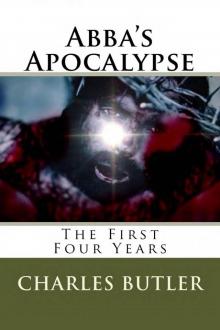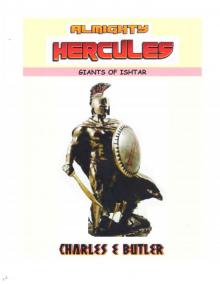- Home
- Charles Butler
Death of a Ghost Page 2
Death of a Ghost Read online
Page 2
“All breasts and blushes,” said Colin in a worldly way, following Ossian’s gaze to a picture of Venus and Adonis. “Have you ever seen so much blubber?”
“I was just thinking,” said Ossian, “about the painting Dad’s going to do. You know that’s why we’re here?”
“God!” Colin clapped his hand to his forehead. “Don’t tell me she wants him to produce something like this?”
“Kind of. It’s supposed to be a picture of a shepherd tending his flock. Green hills and blue skies, but with jet planes and tractors in the background. Old-fashioned but updated, see? A sort of joke. They’re calling it The Golden Age.”
“I should have guessed,” groaned Colin.
“I’m going to be the shepherd, actually. Dad’s asked me to model.”
Colin shook his head. “I hope he’s paying you well.”
“Not bad,” said Ossian. “He’s quite generous like that.”
The pay can be very good, he thought. He had been modelling in the life class at the college in Philadelphia when he’d first spotted Lizzy. She’d been wearing a loose shirt knotted at the front and an expression of concentration which made her freckled nose wrinkle. He’d known right away she would be special. She’d caught him frighteningly well.
“I’m only there to make the scenery look good.”
“Bloody artists, eh?” said Colin cordially. “You hungry, by the way?”
Ossian followed Colin to the kitchen, wondering where the other guests might be. “I saw several cars in the drive.”
“Yes, it’s a party,” said Colin, helping himself to an olive. “My mother’s got some of her horsey friends down – she wants advice on a roan she’s had her eye on. There’s you and Jack, of course. Oh, and a bunch of money-men Dad had to invite. Something to do with his marina project, I think.”
Colin was already on his way out to the lawn. He was carrying too much weight, Ossian noted. His chin barely existed. Was this really the boy he had idolised that summer – the sacrificer-in-chief? At eighteen he seemed virtually middle-aged.
Once, these grounds had boasted peacocks. Ossian remembered being frightened of their strangulated cries, the locust-dry rustling of their fans. Now the lawn was bare, except for the pedestals with their Greek statues that arced to the lake. Things had slipped a bit at Lychfont, he concluded. Zeus and the Olympians were mildewed and rather sombre: Athena in her helmet, Hermes alert as a deer, Pan fluting. Silenus had lost half his grapes in the storms the previous autumn. Yet still they hung on in the alien northern air.
He found Catherine and the other guests listening attentively to Jack.
“It’s good to be back,” he was telling them. “You can be as cosmopolitan as you like, but you forget how much you’ll miss those little things. Marmite, you know, and the shipping forecast.”
“Well, you’ve caught the tan but not the accent – much the best combination. How long were you in the States again?”
“Eighteen months.”
“Enough to see the place in all its moods then. To be a traveller rather than a tourist.”
A small, sunburnt man in a checked shirt said: “The difference being what?”
“Money, I think. Or time.”
“More a question of where you keep your souvenirs – in your hand luggage or in your head,” said someone sagely.
“Or on canvas, of course. What do you have to show for your stay there, Jack?”
Jack cast his gaze modestly to the ground. “Most of the originals are still on exhibition back in Philly, but I have some smaller canvases in the car.”
“I look forward to seeing those,” said Catherine. “Not a day passes but I find something new to admire in the little watercolours you did when you stayed before. I hung them in the saloon, you know. You never painted better, Jack.”
Jack acknowledged this with a small, self-mocking bow. Ossian knew he would not care for the suggestion that his best work was seven years behind him. Jack Purdey had once been the enfant terrible of English landscape painting, but somehow he had never quite made it to the farther shore and become a Pillar of the Establishment. These days all compliments were routinely sifted for nuggets of treacherous dispraise.
As soon as he could, Ossian escaped back to the house. He felt suddenly and deeply tired. It was the effect of the flight, he supposed; he wasn’t used to the time difference. Already he wished he had not come.
And he knew he ought to write to Lizzy.
THE SCRYER’S NEXT question was a delicate one. “May I take it, my lady, that you loved this boy?”
“I do. Even now I do,” said Sulis.
“In the way of chaste desire or are there… other feelings involved?”
Sulis bridled at the man’s insolence. “Does it make a difference?”
“In such cases, invariably,” said the scryer with a fatherly smile. “The currents that run between our realm and his can easily be disrupted by such intimate attunements.”
“I see,” said Sulis coldly. “Well, you may put aside all such worries in this instance. My feelings are vast and profound as any ocean, but they are mine and I control them as I see fit.”
The scryer, who had not yet been paid, assured her that everything was quite in order.
“Then we should begin,” she said.
They were standing in the flagged kitchen at Lychfont: Sulis, the scryer and the scryer’s clerk. The servants’ table had been heaved aside and a dusting of chalk laid down, with heaped ridges of ferrous ash trowelled and footed into shapes appropriate to the scryer’s trade. Sulis recognised them as letters, but could not read them. They were Syriac, she supposed, or Hebrew.
The scryer felt about in his gourd for the dice and knuckle-bones. The curtains were drawn close and the room was sparkling with the reflected glitter of the ash. At a certain point, Sulis noticed that the scryer had begun to sway slightly back and forth, and that an obscure dribble of language was falling from his lips. Again, the speech was unknown to her. She guessed, though, from certain familiar names studding it, what the scryer was about. It was an invocation, though of what quality she could not yet tell. She suspected the man was a quack.
The scryer’s clerk was tapping the gourd, across one end of which the belly skin of a pig was stretched tight. It was quite mesmeric, Sulis had to admit. That, however, was something to beware of. Sometimes these scryers claimed to have fetched out spirits with such rhythms as this, when all they had done was plant a dream in fuzzed and puttied imaginations. It was a trick of the trade.
“Now cast your mind like a net,” said the scryer. “Cast through time and space. Don’t be afraid.”
“I’m not afraid!” cried Sulis.
“Don’t be complacent either,” he returned without breaking rhythm. Sulis felt as if her response had been expected, required – almost a ritual phrase. Anything she said would sink into the rhythm of that gourd and the old man’s chant as completely as a stone tossed on to the Lychfont mudflats. Trick of the trade? There was certainly movement on the ash-strewn floor. It was – jiggling, somehow. Then it stood stark and stiff, like filings magnetised but shifted to a new pattern. The ferrous dust no longer spelt out letters. It now formed – what?
“Is it a map?” asked Sulis.
“One moment!” said the scryer’s clerk. “Silence now, please. Now my master walks the frayed rope between two worlds.”
Better than a circus! thought Sulis mutinously. All the same, she admired the way the scryer still held his rhythm clear of their words. It was dextrous, if a little sinister.
A moment later there was a raucous croak in the rafters overhead. Looking up, Sulis saw a raven.
Charlatan! she thought. An obvious plant!
Perhaps, but the raven was her true totem bird and who but she knew that? Thereafter, it could be heard commenting throatily on the whole consultation.
“Each line shows a way to your man of dust, your Ossian,” said the scryer. “From where he has gone there is no
easy return, I think. He has been…” The scryer seemed briefly at a loss. “How can I put it in a way that won’t seem too alarming?”
“I’m paying you for truth, not tact,” said Sulis. “Are you saying you don’t know where he is?”
“On the contrary, lady. I know very well. Only he is not all… in one place.”
“What do you mean by that? Has he been dismembered?”
“Not exactly. Not physically, that is. But he has been scattered, all the same. Scattered like light through a prism. It is the effect of the flight, the difference in time. To put it bluntly, the boy you seek is no longer a living person.”
“Oh!” exclaimed Sulis in alarm.
“Do not misunderstand me. One might say he is alive several times over. There are many Ossians. I see his face reflected back in the stream of time at myriad angles.”
Sulis had recovered herself. “Then let us by all means cover every angle,” she said with laboured patience.
The scryer looked troubled. “You are aware, no doubt, of the difficulty of a retrieval from history in even the most propitious circumstances. When the subject is in a known location and there are plain tokens of his wish to return, when the signs have all been agreed in advance – even then there is no guarantee of success. I have known cases where what was recovered was mad, or terribly deformed—”
“He’ll have to take the risk. He owes me that. Is this all you have to say against the operation?”
The scryer gave another of his embarrassed laughs.
“It’s all right,” said Sulis impatiently. “I realise it will mean more gold. Just tell your clerk to prepare the equipment.”
The raven fluttered down from the rafter and sat on her shoulder. It croaked – encouragingly, Sulis thought.
“I cannot do it yet. No, lady, put away your gold, this has nothing to do with money – though the process is expensive and in due course an adjustment of my fee will no doubt be required. But the technical difficulties are formidable. You wish to find Ossian? Then in each of the places where he now dwells you will need to assume an appropriate form. To determine that takes time.”
Sulis sighed. Why did scryers insist on expressing themselves so elliptically?
She was sure that money lay at the root of it. A few more minutes and the scryer would go stiff and start speaking gibberish. Then she would be asked to lay out extra on one of those interpreting women, always so gummy and unhygienic, to render him intelligible. Such a racket!
However, the scryer showed no sign of stiffening just yet. “I can help you to enter Ossian’s sphere of existence, once the proper observances have been made. Your way, however, lies by the path of oblivion. In passing through it you must learn to suppress – partially suppress – your higher nature.”
Sulis was poised to take offence. “What are you saying? That I should put aside my divinity?”
“For the noblest of reasons, I assure you! Ossian is located in a particularly impoverished environment, one that will not sustain a person of your great eminence without peril. I can place you there, of course…”
“But what?” prompted Sulis stonily.
“But not in your – habitual form.”
“I don’t care what form I assume. I shall manifest myself, claim Ossian and be gone. If the people yield him up without fuss, I may even plant a shrine among them.” Sulis pondered the idea. “A spring of healing water, perhaps. I’m fond of springs.”
“A very pretty thought, lady. But it may not be so easy. Should you act in ways that are too obviously divine you will weaken the barriers that separate the worlds, with danger to both. On the other hand,” the scryer added with a dark emphasis, “there is an equal and opposite danger: that you will be absorbed wholly into their world.”
“Me? Absorbed?” retorted Sulis grandly. “Do you know who you are talking to?”
The scryer trembled slightly at her tone, but persisted. “When you are there, you will belong to the Ossian’s place and time. You yourself will not know, except in the most shadowy and imperfect manner, who you truly are.”
The scryer had been reluctant to broach this subject and with good reason. Perfect memory was as much part of Sulis’s divinity as her eternal youth. But Sulis, for once, showed no resentment. She actually smiled and told the scryer condescendingly: “Not know who I am? That might be possible for certain classes of person, I dare say. I don’t think I shall forget myself, gentle scryer. Never worry on that account.”
The scryer seemed relieved, but was obliged to add: “There remains the problem of temporal dispersal.”
Sulis clapped for a dish of sherbet. “Explain that part again,” she sighed.
LYCHFONT HOUSE
LYCHFONT
HANTS
Hi Lizzy
I said I’d write as soon as I got here, didn’t I, and tell you about the journey. And here I am doing it, just like the dork you’ve always called me. The flight was fine. Soggy chicken but I kind of liked it. I even survived Dad’s driving – just. The only lousy thing was the direction. Away from you. I don’t know much about art, but I know this landscape would look better with you in it. I don’t know much about love either, but I think I’m in it with you. With you but without you. Philosophical, huh? On the whole, I’d rather be in Philadelph—
Ossian put a diagonal line through all that. How come he was suddenly so gushy? He seemed to have got sidetracked into writing exactly the wrong kind of letter. This wasn’t Lizzy’s thing at all. She liked to know about people and music and clothes; she liked to hear the funny things people said and who laughed. She liked – needed – to picture it all, as if she were watching a movie. But Ossian did not notice things in that way, or did not remember them; in any case, he couldn’t shape them into words. And now he had lost the knack of saying easy, natural things. He drew a picture instead, of Catherine and her friends yakking under summer hats and stuffing themselves with smoked-salmon sandwiches. Social satire on the British: Lizzy would laugh at that all right.
But it wasn’t what he’d wanted to tell her. He’d wanted to tell her that he was in love. Why was that so difficult to say straight out? It wasn’t as if Lizzy wanted him to be witty all the time. That was one of the things that condemned Jack in her eyes. “I only want you for your body, stupid,” she used to say.
He never could be sure how much of a joke that was.
He shut the pen and paper in the drawer of the side table. It was too fine a day to spend in his room. The others would think he was sulking. He went down the short corridor to the bathroom and washed his face. He had to pick his way, for the shadows there contained alcoves in which heavy stone busts brooded, Catherine’s collection of noble Greeks and Romans. Julius Caesar’s nose came close to catching him in the ribs.
Catherine had moved to a hammock seat, twenty metres from the terrace. Six or seven people were gathered there now, and Catherine herself swung under the hammock’s flowery awning, its shadow tasselling the lawn. The sharp sun made the scene unreal. As he stood in the doorway, Ossian tried to sort out which of the guests were Catherine’s horsey types, and which Mr Frazer’s businessmen. Catherine was being inscrutably polite to all.
“Yes, hardly anyone has heard of it,” she was saying in response to a query from a lugubrious man whose lip was haunted by a wisp of pale moustache. “The Abbey ruins here are not, of course, to be mentioned in the same breath with Rievaulx or Fountains, but in a quiet, backwaterish way Lychfont has its own dignified tale to tell.” Sensing a silence, she added: “Henry VIII always struck me as such a lout, don’t you agree?”
Everybody did agree; they had no choice. The lugubrious man’s wife had always preferred the Stuarts, she said – much more dashing in those wigs.
“Nothing like being beheaded to give a man romantic appeal.”
Ossian, who had been approaching in the shade of the wall, heard the laugh that followed this, a laugh like glasses being chinked, and checked his step. The mention of beheading ca
used him to grip his own neck and his Adam’s apple rose and fell. Everyone in that group must be at least twice his age. And in that time, what smoothing of rough edges there must have been; how ready the world had made them for this sipping of drinks on the lawn at Lychfont House, and laughing tinkling laughs and chiming with the tinkling laugh of Catherine.
Fool that he was, he felt afraid – as if he were nine again. Any moment now, Catherine would turn and see him, wave and invite him to be clever too. And he couldn’t – wasn’t. He turned on his heel with his face flushing hot in the shadow. How stupid! And he knew they had seen him after all, for Catherine was saying: “Jack’s boy? Yes, always a quiet one. Hard not to be overshadowed by Jack, of course.”
“Not that it’s a competition,” said another female voice – but by now Ossian had made the corner of the house and seen the grass bump down in cloddy terraces to the flood meadow.
Sod Catherine Frazer, comparing him with Jack like that. That was all she saw when she looked at him, then: an after-image of Jack Purdey, much dimmer than the original. Or a muffled echo mouthing things that had already been said more clearly, more cleverly, better. It was humiliating – but oddly enough, it also made him afraid, in a way that had nothing to do with his father. It made him wonder whether he was real at all. In this mood, he became conscious of the bending of the grass beneath his feet, the play of light on the skin of his eye. He was fearful that at any moment he might unravel, be revealed as a random knot of touch and sound, a net of shadows cast from some place far beyond him.
It was at such times, indeed, that he was most likely to meet with ghosts.

 Death of a Ghost
Death of a Ghost Abba's Apocalypse
Abba's Apocalypse Casanova's Adventure of a Lifetme
Casanova's Adventure of a Lifetme Almighty Hercules
Almighty Hercules